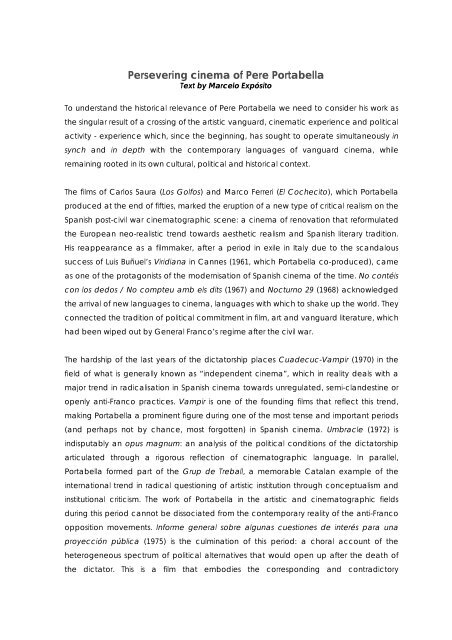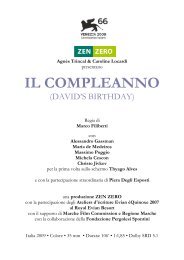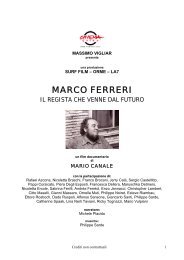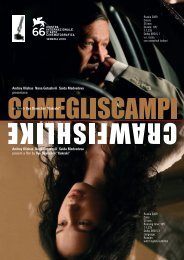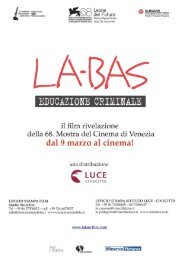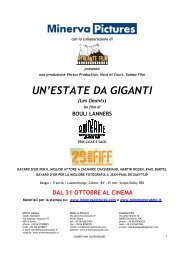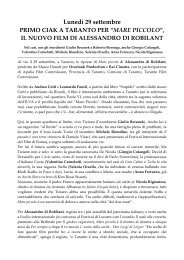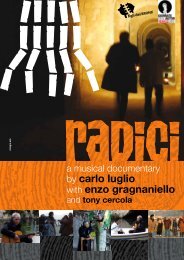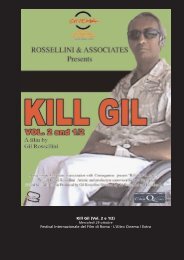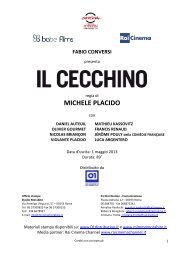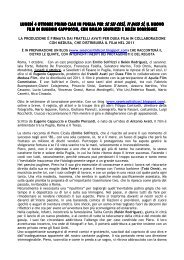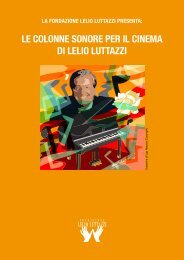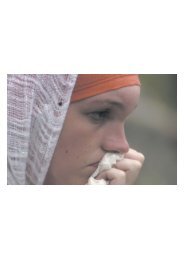Die Stille vor Bach - Studio Morabito
Die Stille vor Bach - Studio Morabito
Die Stille vor Bach - Studio Morabito
Create successful ePaper yourself
Turn your PDF publications into a flip-book with our unique Google optimized e-Paper software.
Persevering cinema of Pere Portabella<br />
Text by Marcelo Expósito<br />
To understand the historical relevance of Pere Portabella we need to consider his work as<br />
the singular result of a crossing of the artistic vanguard, cinematic experience and political<br />
activity - experience which, since the beginning, has sought to operate simultaneously in<br />
synch and in depth with the contemporary languages of vanguard cinema, while<br />
remaining rooted in its own cultural, political and historical context.<br />
The films of Carlos Saura (Los Golfos) and Marco Ferreri (El Cochecito), which Portabella<br />
produced at the end of fifties, marked the eruption of a new type of critical realism on the<br />
Spanish post-civil war cinematographic scene: a cinema of renovation that reformulated<br />
the European neo-realistic trend towards aesthetic realism and Spanish literary tradition.<br />
His reappearance as a filmmaker, after a period in exile in Italy due to the scandalous<br />
success of Luis Buñuel’s Viridiana in Cannes (1961, which Portabella co-produced), came<br />
as one of the protagonists of the modernisation of Spanish cinema of the time. No contéis<br />
con los dedos / No compteu amb els dits (1967) and Nocturno 29 (1968) acknowledged<br />
the arrival of new languages to cinema, languages with which to shake up the world. They<br />
connected the tradition of political commitment in film, art and vanguard literature, which<br />
had been wiped out by General Franco’s regime after the civil war.<br />
The hardship of the last years of the dictatorship places Cuadecuc-Vampir (1970) in the<br />
field of what is generally known as “independent cinema”, which in reality deals with a<br />
major trend in radicalisation in Spanish cinema towards unregulated, semi-clandestine or<br />
openly anti-Franco practices. Vampir is one of the founding films that reflect this trend,<br />
making Portabella a prominent figure during one of the most tense and important periods<br />
(and perhaps not by chance, most forgotten) in Spanish cinema. Umbracle (1972) is<br />
indisputably an opus magnum: an analysis of the political conditions of the dictatorship<br />
articulated through a rigorous reflection of cinematographic language. In parallel,<br />
Portabella formed part of the Grup de Treball, a memorable Catalan example of the<br />
international trend in radical questioning of artistic institution through conceptualism and<br />
institutional criticism. The work of Portabella in the artistic and cinematographic fields<br />
during this period cannot be dissociated from the contemporary reality of the anti-Franco<br />
opposition movements. Informe general sobre algunas cuestiones de interés para una<br />
proyección pública (1975) is the culmination of this period: a choral account of the<br />
heterogeneous spectrum of political alternatives that would open up after the death of<br />
the dictator. This is a film that embodies the corresponding and contradictory


